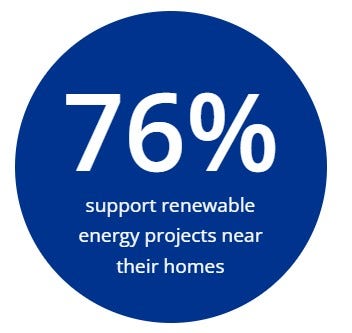According to our research, over three-quarters (76%) of respondents support renewable energy projects near their homes, with even stronger backing from 18-24s (85%) and over 65s (82%).
For the 1 in 10 who opposed renewable projects where they live, they cited the impact on the local landscape (60%), the impact on the local wildlife (50%) and the impact on their property (40%) as their main reasons for not supporting such projects.
Most (79%) support offshore wind energy projects, and nearly three-quarters (74%) endorse onshore wind and solar energy initiatives. This robust backing for renewable energy is encouraging but at odds with the slow progress of projects through planning and into construction.
It emphasises the influence individuals, small groups, and campaigners opposing projects have in the planning phase. In addition, it highlights the inadequacy of Ireland’s planning laws and planning delays. We believe policymakers and landowners should consider how these large-scale infrastructure projects would benefit the greater community and how this can be best communicated.
On the other hand, enthusiasm wanes for high-voltage power lines at 34%. This is concerning as we require significant grid investment to transport energy across the island involving a network of pylons and high-voltage lines that are crucial for the security of Ireland’s energy infrastructure.



